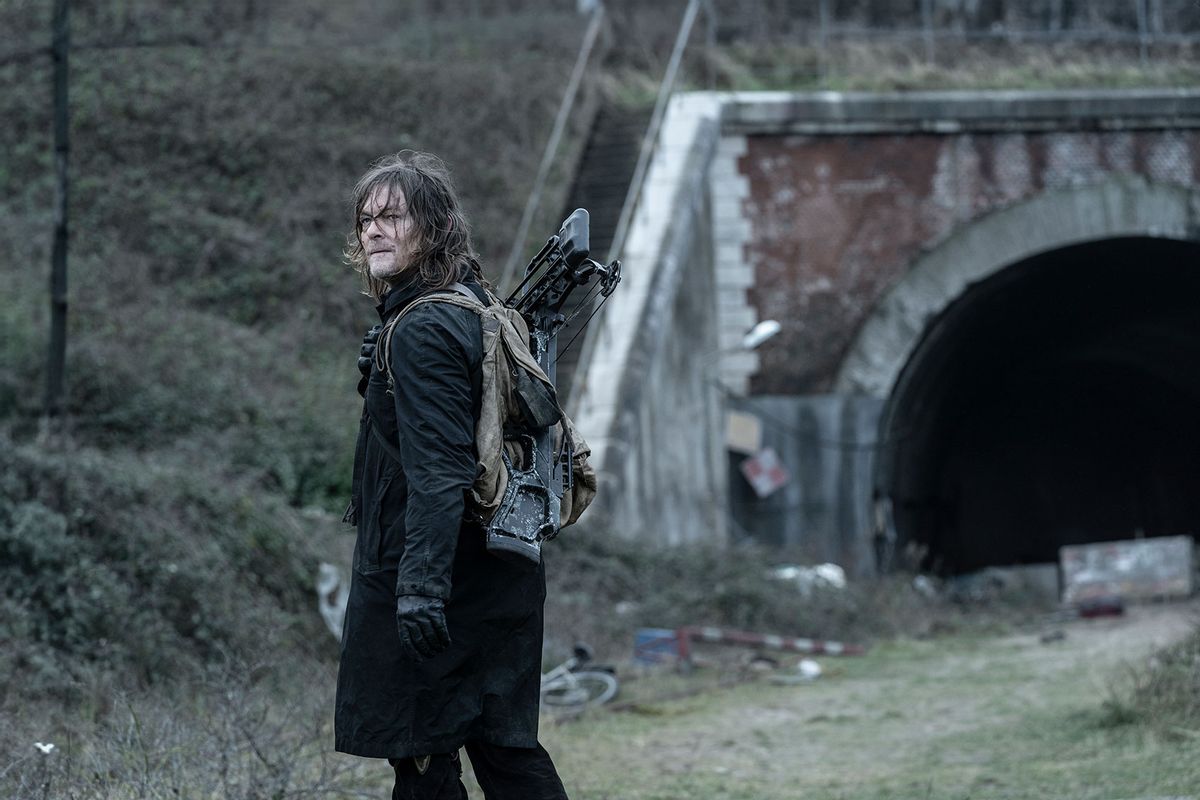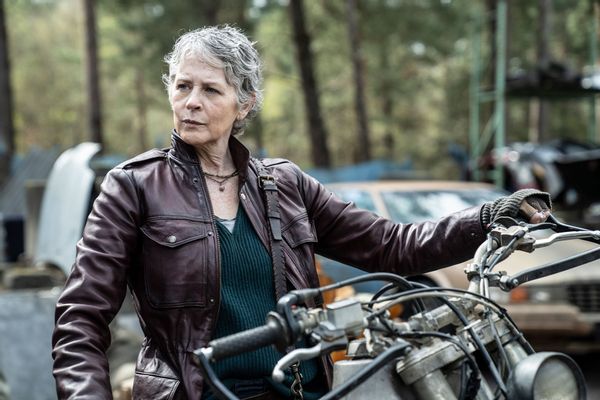Norman Reedus and Melissa McBride’s chemistry just barely makes this bridge chapter worth the ride
 Norman Reedus as Daryl Dixon in “The Walking Dead: Daryl Dixon” (Stéphanie Branchu/AMC)
Norman Reedus as Daryl Dixon in “The Walking Dead: Daryl Dixon” (Stéphanie Branchu/AMC)
All great stories can be dragged down by fan service. No matter how lofty the concept, regardless of how successfully it launches, the gravitational pull of “giving the people what they want” has a way of loosening the bolts on an otherwise tight fuselage.
“The Walking Dead: Daryl Dixon —The Book of Carol” is not immune to this, although the second leg of Daryl Dixon’s journey isn’t an unpleasant ride-along either. Whatever its shortcomings are minimized by the general amiability of its mission, placing Norman Reedus’ craggy and decidedly atheistic biker inside of a story where the force driving the good guys is spiritual belief.
When last we saw Daryl and his road companions Isabelle (Clémence Poésy) and a boy named Laurent (Louis Puech Scigliuzzi), they’d reached safety in Normandy, where a multi-faith community vowed to protect Laurent, who they believe is a messiah. It was an apt and sunny resolution to that part of the story, although Daryl still needed to get home.
But as soon as showrunner David Zabel teased that Melissa McBride’s Carol Peletier would join the story in the finale’s post-credits scene, there was reason to be equally intrigued and somewhat worried. The brilliance of “Daryl Dixon” is how its circumstances forced Reedus’ character, a creature torn between group loyalty and loneliness, to figure out where he fits not just within his group, but in the world.
Losing Daryl in the French countryside, a place where no one knows him and he doesn’t understand the language, forced him to confront that question and his reasons for going on.
Within that self-examination resides a broader parable about the belief’s power in fueling hope, that essential ingredient of survival. There’s also a hefty helping of American nonsense concerning French culture; just as we take it as a given that coyotes, cockroaches and Cher will survive the apocalypse, it seems that Zabel and the writers envision that the French will always find a way to cabaret, even if civilization has fallen.
Nevertheless, the undercurrent of faith made what could have been another glum odyssey surprisingly moving at times, broadening not only the title character’s range but showing off Reedus’ too.
 Melissa McBride as Carol Peletier in “The Walking Dead: Daryl Dixon” (Emmanuel Guimier/AMC)Adding McBride’s Carol to this postcard doesn’t necessarily threaten to diminish that. Instead, what “Book of Carol” proves is that she’s as deserving of a full solo act as he is. That concept’s marketability in a franchise with a male-skewing audience is probably limited. Plus, the Internet loves the idea of Daryl and Carol together even if they’re not, you know, together.
Melissa McBride as Carol Peletier in “The Walking Dead: Daryl Dixon” (Emmanuel Guimier/AMC)Adding McBride’s Carol to this postcard doesn’t necessarily threaten to diminish that. Instead, what “Book of Carol” proves is that she’s as deserving of a full solo act as he is. That concept’s marketability in a franchise with a male-skewing audience is probably limited. Plus, the Internet loves the idea of Daryl and Carol together even if they’re not, you know, together.
All the afterlife spinoffs of “The Walking Dead” ride the appeal of core duos whether they be oppositional (as with Maggie and Negan in “Dead City”) or romantic (Rick and Michonne in “The Ones Who Live”).
Daryl and Carol share a different bond, something more than family but not quite amorous. They’re also versions of survivors that don’t neatly fit into the popular fantasy of brute strength and frontier gutsiness.
Daryl looks and acts that part, certainly, but both his and Carol’s survival training came by way of living through abuse. With Carol, we saw that evolution from a placating wife and grieving mother into someone acutely aware of how strangers see her, and the ways that she can use their assumptions to her advantage. That’s what makes McBride singularly compelling in playing her – she’s constantly holding Carol’s danger and determination under a gossamer veil of meekness.
“I’m a friendly!” she peeps as she walks into a camp full of road pirates, hands up, distracting them with the appearance of fear and softness. Not long afterward, they’re cowering at her feet as she robs them.
Her broader arc in “Book of Carol” has to do with facing her greatest trauma and the moment that haunts her incessantly. The millions of people who watched “The Walking Dead” early in its run can guess what that is, but if you’ve forgotten, these episodes have several moments where Carol is gripped by PTSD at the sight of a barn door.
The writers take a few steps to tease out the way that cruel tragedy sharpened Carol’s survival tactics, forcing a spiritual reckoning when she exploits to win the trust of Ash (Manish Dayal), a kind man Carol uses to fulfill her self-assigned mission.
But that inward gaze is less of a consideration than lubrication on the mechanics of getting Carol from Point A, i.e. North America, to Point B, France, albeit with a comically strange layover culminating in what is a comic fanboy’s dream, or his biggest nightmare.
Her and Daryl’s paths run parallel until about midway through the six-episode season, which is blessedly expedient as such stories go. By then, the meaning of what worked so well in Season 1 begins to fall apart.
“The Book of Carol” takes the first season’s examination of faith and filters it through the tainting influence of religion as a means of control, which fits the brand; nothing seemingly wholesome in “The Walking Dead” ever is.
This turn also forces what could have been a thoughtful and provocative storyline to rush to a conclusion that deteriorates the story with impressive velocity. Their reunion straddles conflicts with Anne Charrier’s nouveau-fascist Genet and deeply philosophical disagreements with Isabelle and Daryl’s new host Losang (Joel de la Fuente), a pair of antagonists who prove to be disposable.
Luckily for AMC – and “TWD” diehards, I guess – most of the audience isn’t watching these shows for their explorations of philosophy or thoughtful parsing of what it means to believe in something greater than yourself, for good or ill. It is probably enough of a thrill to watch Daryl dispatch with zombies and despots using a medieval flail, or Carol stalk around centuries-old French villages like a commando.
In essence, “The Book of Carol” lacks the layered heft those who were pleasantly surprised by the previous chapter might have expected. But in keeping with the overall theme of this side mission, there’s hope: Season 3 is already in production, giving us another chance to meet Daryl and Carol in a storyline that makes them equal partners.
“The Walking Dead: Daryl Dixon —The Book of Carol” premieres at 9 p.m. Sunday, September 29 on AMC.





